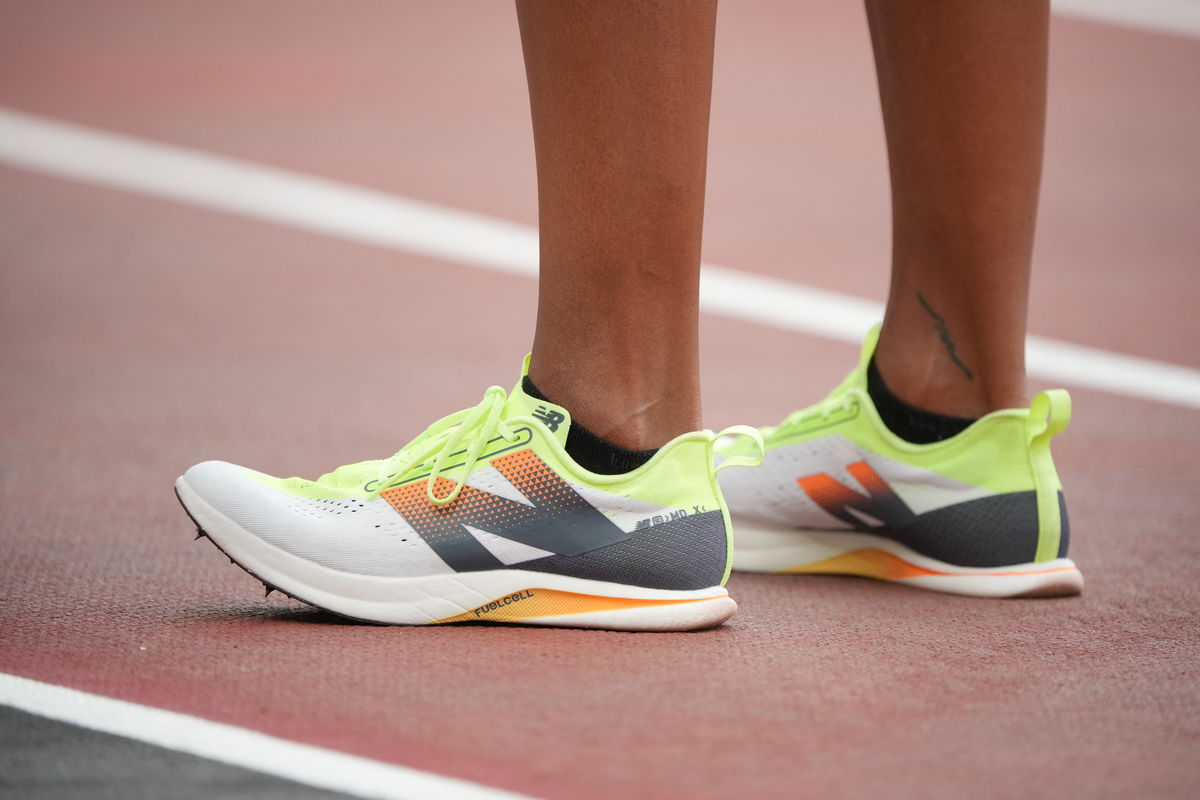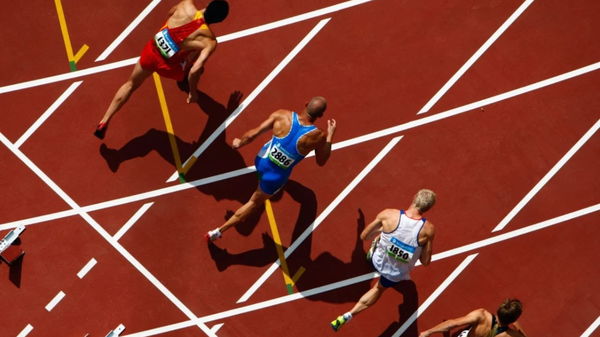
USA Today via Reuters
Jul 20, 2024; London, United Kingdom; The New Balance FuelCell MD-X spikes worn by Gabrielle Thomas aka Gabby Thomas (USA) in the women’s 200m during the London Athletics Meet at London Stadium. Mandatory Credit: Kirby Lee-USA TODAY Sports

USA Today via Reuters
Jul 20, 2024; London, United Kingdom; The New Balance FuelCell MD-X spikes worn by Gabrielle Thomas aka Gabby Thomas (USA) in the women’s 200m during the London Athletics Meet at London Stadium. Mandatory Credit: Kirby Lee-USA TODAY Sports
The track and field sports realm has been going through issues like low income for many years. The athletes have not been compensated suitably, whereas several have faced complications with sponsors. Despite giving everything to the sport and winning titles, big names like Alaysha Johnson had to spend their own funds to carry out the expenses of their drills. However, certain contests like Grand Slam Track and World Athletics Ultimate Championships are on the cards. Contests like these promise to add an immense sum as prize money to the athletes’ accounts. But before that, the track and field athletes will have to cross certain boundaries.
Watch What’s Trending Now!
No, the contests don’t decide those boundaries. There are a few invisible barricades that are present in every track and field sports contest. The athletes have to jump over those to compete in the events and win the prize money. But what are those barricades and who will help the athletes to jump over those? An American Olympian spoke at length about it.
The track and field events come with some characters behind the scenes
Entering an event, winning it, and claiming the prize money—it could have been that much simpler to earn dimes in track and field sports. But in the real picture, things are different, according to Justin Gatlin. Instead, it requires several steps before finally obtaining the money. What are those steps?
In the YouTube podcast Run Your Race, Justin Gatlin explained, “You got to think like you are the dude who’s slinging his product on the corner, and why I say that is because it’s like you put the work in at practice and then you got to show how good you are once you get onto the track. You got to prove to the sponsors and the meet promoters that I’m good enough to come to your race.” But that’s not the end of it. The athletes will have to compete in various events to prove their versatility. Participation in each contest will bring money and also work as a resume. But how will the chance to enter the contest come?

According to the former Olympic champion, the athletes will need negotiation before entering the contests. Naturally, they themselves will not be part of the process. Then? That’s where the agents enter. The track and field veteran shed light on the agents’ roles. He said, “You have to negotiate, your agent have to negotiate to even play at that arena. That’s how track and field is. There’s not a circuit where it says oh you’re in the diamond league so you get to run all these races because you can.” Therefore, to earn tickets for any arena or contest, the athletes will need the agents for negotiations. Nonetheless, the question is does it apply to athletes competing just in the US or all over the world? The three-time world champion had a sharp reply.
In the podcast, Justin Gatlin shared, “Your agent negotiates Oslo. Your agent negotiates Rome. Your agent negotiates Japan like you have to negotiate each race and each race can come with a different prize or purse of money. You know what I’m saying so that’s what it is.” With better negotiation, the athletes may add a better number to the account. However, there’s another part where an agent can help an athlete collect massive numbers as earnings.
The era of agents is coming closer
Parker Valby, the cross-country runner and NCAA champion, had signed a lucrative NIL deal with Nike. Those days, she didn’t have huge star power at the track and field sports events. That was reflected in her NIL deal, which, according to Valby, didn’t do justice to her talent. So? What was the way out? Parker’s father, Kyle, came forward. His business mind gave him a way to take chances on the deals. How?

Both Parker and Kyle Valby took the chances. They delayed the pro signing deliberately, just to try out other offers. Meanwhile, brands like Puma, On, and many others followed Parker. And why shouldn’t they follow? The runner won six NCAA titles and was a potential candidate for larger contests.
Those points led Kyle Valby to negotiate with the brands. However, his role as the agent brought good news to her meanwhile. She landed a massive pro deal offered by New Balance. She didn’t need to deal with the meager number provided by Nike. Instead, she amassed something that she wanted. Also, the new sponsorship deal earned her a chance to train with an Olympian. Credit goes to her father’s role as the agent. Now, Justin Gatlin shows another aspect of an agent’s role. Is the era of the agents arriving in the track and field sports world too? What do you think?

